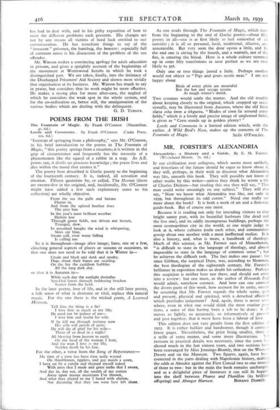POEMS FROM THE IRISH
"INSTEAD of springing from a philosophy," says Mr. O'Connor, in his brief introduction to the poems in The Fountain of Magic, "this poetry springs from a situation; it is written in the grip of circumstance and frequently has the intensity of a phenomenon like the squeal of a rabbit in a trap. As A.E. points out, it distils no precious knowledge ; the poem lives and dies within the mood that creates it."
The poetry here described is Gaelic poetry to the beginning of the fourteenth century. It is, indeed, all sensation and emotion. Fifteen quatrains by, or called, The Hermit (there are twenty-five in the original, and, incidentally, Mr. O'Connor might have added a few such explanatory notes to his collection) are wholly objective.
From the sea the gulls and herons Flutter in, And from the upland heather rises The grey hen In the year's most brilliant weather Heifers low Through green fields, not driven nor beaten, Tranquil, slow.
In wreathed boughs the wind is whispering, Skies are blue, Swans call, river water falling Is calling too.
So it is throughout—image after image; lines, one or a few, clinching general aspects of places or seasons or occasions, so
that one does not need to be told that it is Winter in—
Crude and black and dank and smoky, Dogs about their bones are snarling. On the fire the cauldron bubbles All the long dark day.
or that it is Autumn in—
While each day the sunlight dwindles Speckled fawns through reddening bracken Scatter from the herd.
In the later poetry, love of life, and in the still later poetry, a folk sense of what is dramatic or vital, replace this natural
magic. For the one there is the wicked poem, A Learned Mistress. Tell him the thing is a lie!
I love him as much as my life; He need not be jealous of me-
t love him and loathe his wife.
If he kill me through jealousy now His wife will perish of spite;
He will die of grief for his wife—
Three of us dead in a night!
All blessing from heaven to earth On the head of the woman I hate,
And the man I love as my life,
Sudden death be his fate.
For the other, a verse from the Song of Repentance:— My time of a time has been time sadly wasted
On thimblemen, tipplers, and gay maids a score, I have sat by a candle and rhymed myself naked With jeers that I made and great oaths that I swore, And day in, day out, all the wealth of my station Away upon master musicians I've thrown, And what they played to me I heard with elation, Not dreaming that they too were best left alone.
As one reads through The Fountain of Magic, which rut from the beginning to the end of Gaelic poetry—about fift., poems in all—one is at first likely to feel somewhat of an outsider ; it is all so personal, local, traditional, allusive, un• annotatable. But very soon the door opens a little, and h, the end one is sitting by the hearth, and a warmth, not of the fire, is entering the blood. Here is a whole culture summed up in some fifty translations as near perfect as we are ever likely to get.
Only one or two things jarred a little. Perhaps another would not object to "Pigs and goats nestle near." I am not happy about
Birds of every plain are mournful But the hot and savage ravens At rough winter's shriek.
Two commas would settle the matter. And the old trouble about keeping closely to the original, which cropped up occa- sionally, may be illustrated from Autumn, where the old Irish slatta etha imm a ithgurtu, "Blades of corn lie around corn- fields," which is a lovely and precise image of ungleaned fields, is given as "Corn stands up in golden plenty! "
Lords and Commons is a limited edition which, with the earlier. A Wild Bird's Nest, makes up the contents of The










































 Previous page
Previous page